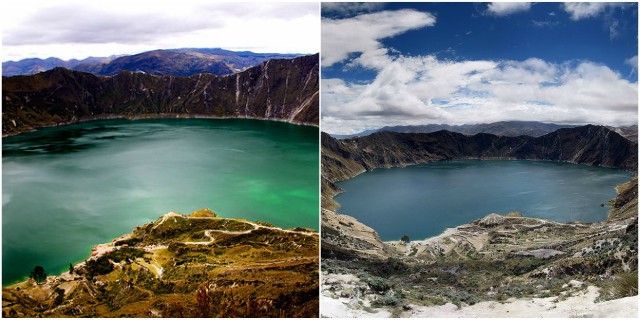Lake Quilotoa- a breathtaking Volcanic Lagoon formed 800 years ago in Ecuador

Located 66 kilometers south of the city of Latacunga, in the parish of Zumbahua, the Lake Quilotoa is a breathtaking sight in Ecuador.
This amazing turquoise lake lies in the caldera of a dormant volcano at 3,800 meters (12,467 feet) above sea level and it’s a popular tourist destination for foreigners as well as Ecuadorians.

Laguna Quilotoa has formed about 800 years ago, after a massive eruption which led to the collapse of the Quilotoa volcano.
After the eruption of Quilotoa, the lava flows reached the Pacific in a distance of almost 200 km while the formed caldera was 3 km across, with a lake inside it.

Locals believe that the lake is bottomless and geologists estimated it around 250 meters deep.
The name “Quilotia” derives from the local Quechua language, and it’s a combination of the words “quiru” (for tooth) and “toa”(for queen), referring to the shape of the lagoon.
The lake lies 1,300 feet below the rim of the collapsed dome, and its color can vary according to the dissolved minerals in the water, from bluish green to nearly yellow, depending on the season.

Only a few types of micro-organisms and algae exist in the water since there aren’t any fish or aquatic life. Locals suggest swimming in the water, but its temperature is between 16°C and -1°C.
Laguna Quilotoa is part of the new Ilinizas Ecological Reserve, administered by Ecuador’s National Park Service. Within this ecological reserve, there are several different types of ecosystems, and it’s open for hiking and horseback riding devotees.

Many animal species can be seen around the lake such as the wilderness wolf, fox, rabbits, deer, cervicabra and other species. Also, there are over 290 native species of plants in the Ilinizas Ecological Reserve.
Laguna Quilotoa is only 3 hours from Quito, so the people usually start their tour by taking one of the local buses from the small village of Zumbahua and their next destination is one smaller village in Quilotoa.

Locals benefit from the booming tourism trade, operating hostels, guest houses and guide services.
Most of the visitors spend the night in the hostels since Laguna Quilotoa is often obscured by clouds in the afternoon. Usually, they head off towards the caldera early in the morning because mornings offer the best views.

The hike around the rim (4–5 hours) is the best way to get close to the stunning views which lie into the deep lake.
